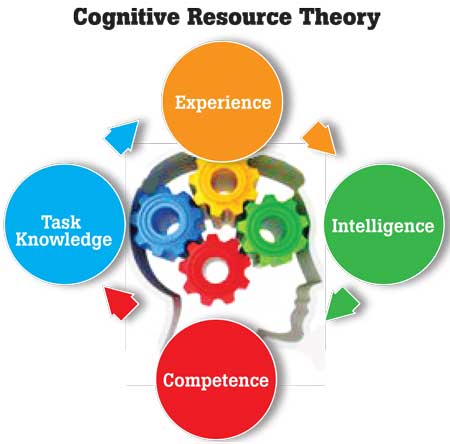Reply To:
Name - Reply Comment
.jpg)
The Cognitive Resource Theory of Leadership was developed by Fred Fiedler and Joe Garcia in 1987. The cognitive resources of a leader identified in this model are their experience, intelligence, competence and task-relevant knowledge. This theory discerns that stress can be a factor that prevents an intelligent leader from being effective and there is no ideal leader for all business situations and all business seasons.
Leaders are said to be either task oriented or relationships oriented. Leaders who are task-oriented tend to view person’s worth in terms of what is to be done. Leaders who emphasize the importance of human relations tend to view co-workers more favourably over task. These factors confirm why there is no ideal leader profile, because every situation is different and the leaders are required to deal with various situations under different stress levels.
factors confirm why there is no ideal leader profile, because every situation is different and the leaders are required to deal with various situations under different stress levels.
Fred Fiedler states that a leader uses his or her intelligence to formulate strategies, communicate action plans to the group and then seek the support from the group members to execute the plans. At any one of these phases, stress may change or have an impact on the effective outcome.
The leader is more effective when his style is more orderly, premeditated and authoritarian. However, Fred Fiedler believed that intelligence is not always an important and essential factor in leadership. An intelligent leader or a leader with a high IQ can work effectively and able to think out of the box under low-stress situations, where as an experienced leader will rely more on past occurrences and experiences.
As an intellectual person will seek for rational solutions but, not all problems have rational solutions probably he may not be resourceful under high-stress situations. In a high-stress situation, a person with lower IQ level but more work experience may be able to lead better. Further, if a leader has poor relationships with the group, stress could be an impediment in achieving leadership potential.
A leader needs to be an effective communicator to in.jpg) struct and guide. An intelligent leader provides intellectual effort in planning, rationalizing, strategizing and decision-making to realize business objectives. He seeks support from team members and depending on the level of work stress and his relationship with his team members, decides how efficiently he will be able to deal with a situation.
struct and guide. An intelligent leader provides intellectual effort in planning, rationalizing, strategizing and decision-making to realize business objectives. He seeks support from team members and depending on the level of work stress and his relationship with his team members, decides how efficiently he will be able to deal with a situation.
If he is not in good terms with his team members then his leadership qualities may be diluted in execution. When under stress, intelligence does not help and that’s where a forceful commanding ability with experience is required. Hence, for a leader, effective communication is a must and therefore must have clarity of purpose, scope and expectations of a task to be directive. However, without the support from his team members, a leader cannot be effective and that depicts dependency.
Intelligent leaders speak more when in high-stress situations than less intelligent leaders. They feel the punch of the deadline pressures and generally people in their teams contribute less to creative ideas. They could end up being upset and could also overreact to small things, negatively-affecting other team members too.
Stress can be transferred from one person to the other if a stressed-out person is unable to handle it. The theory also states that simple jobs or tasks do not require intelligence or experience. If a job is simple and it does not require directions and guidance then no matter how good the leader is, his support will not be needed by his team. Therefore, such jobs require minimum leadership, more management. In using the Cognitive Resource Theory, there are a number of pre qualifications and limitations to be mindful of.
.jpg)
Advantages